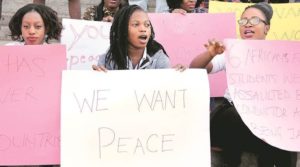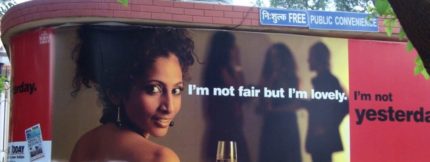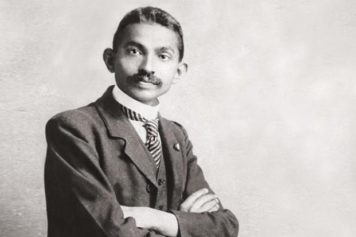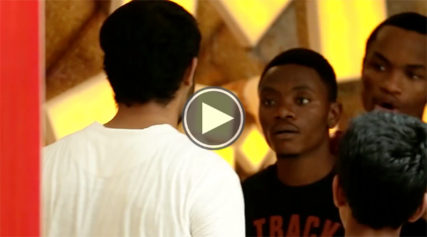
Members of the Association of African Students in India protest racial attacks in the country. (Kashif Masood)
Six Africans were physically assaulted across the Indian capital of New Dehli last Thursday.
At least five arrests were made in connection with the assaults, which Deputy Police Commissioner Ishwar Singh stressed Sunday were unrelated and happened at various locations, at various times and “for different reasons.”
None of those include racism, Singh told Indian television station NDTV, Al Jazeera reports.
“It’s not as if there’s a public movement against African nationals.”
A Nigerian man in Hyderabad was brutally beaten with an iron rod during a dispute over a parking spot May 25. A city sub-inspector said a local man attacked the 23-year-old college student whose vehicle was parked in front of his home. The Times of India reported the gaping head injury required eight stitches to close.
In late January, a 21-year-old Tanzanian woman was allegedly stripped and sexually assaulted by an angry mob in the city of Bangalore, per The Washington Post. The student told police she was riding in a car with African classmates, when they happened to come upon the scene of a motor accident just minutes after it occurred. Residents were fuming over the death of an Indian woman who had been run over by a Sudanese driver. The student said she and her friends were dragged out of the vehicle before locals set it on fire.
India is a popular destination for young Africans wishing to study abroad. The estimated 30,000 African students currently living in the south Asian country face daily risks to public safety due to a recent string of racial attacks against African nationals.
Congolese teacher Masonda Ketada Olivier was reportedly stoned to death by a group of drunken juveniles in South Delhi’s Vasant Kunj following a verbal altercation over hiring an auto-rickshaw the evening of May 20.
In the wake of the incident, a coalition of African ambassadors warned Indian officials they would discourage student migration between the nations.
“Given the pervading climate of fear and insecurity in Delhi, the African Heads of Mission are left with little option than to consider recommending to their governments not to send new students to India, unless and until their safety can be guaranteed,”said Alem Tsehage Woldemariam, Eritrean Ambassador and dean of the Group of African Heads of Mission in a statement.
The group pressed Indian officials to take immediate measures to guarantee the safety of African citizens, including the implementation of cultural sensitivity and awareness programs to combat rampant “racism and Afro-phobia” in the country.
The African Heads of Mission said they would also boycott scheduled Africa Day celebrations as the community mourned, though the group later agreed to attend at the encouragement of Indian leaders.
Times of India reports the external affairs minister denied Tuesday that the attack on Olivier was racially motivated. Sushma Swaraj and other ministry leaders held discussions with representatives from the Association of African Students in India from the capital city.
“I met a delegation of African students and two leaders and told them the incident is not only unfortunate but also painful,” Swaraj said. “However, I also tried to explain [to] them that the incident was not one of racial discrimination and should not be seen in that context.”
Swaraj argued that footage of the incident “clearly” showed Indian locals attempting to save Olivier and said two people had been arrested in connection with the death, according to a same-day report by the lieutenant governor.
“We’ve chalked out a plan as per which, our MoS along with the Secretary, will visit every metro city and hold discussions with African students. We will initiate programs of awareness and sensitization in areas with the maximum population of African students so that such incidents don’t recur,” Swaraj said.
Swaraj’s statements echoed those made by other leaders, eager to downplay the severity of racial tensions in India.
Mahesg Sharma, tourism and culture minister, expressed concern that such crimes would result in a negative reputation for the country.
“India is a large country and such incidents will give a bad name to India. It is an unfortunate incident,” Sharma told local news agency IANS.
She went on to contend that violence was not unique to India. “However, even Africa is not safe.”
Not all Indian citizens desire to cover up the racial divides between natives and African migrants.
Instead, Indian photographer Mahesh Shantaram wants to put the negative experiences of African students on display with his project “Racism: The African Portraits.” The visual body of work will tell immigrant stories through pictures and personal accounts.
Scroll.in profiled the 38-year-old documentarian, who said he was taken aback by the spate of attacks against Africans in his home town.
“The reaction to such incidents is always along the lines of, ‘This can’t happen in my city.’,” he said. “Nevertheless, this incident made me realize that there were so many Africans living in my city about whom I knew nothing about. I decided to see the place where the students were living. Why were they living there? What was their life like? Curiosity motivated me to go.”


